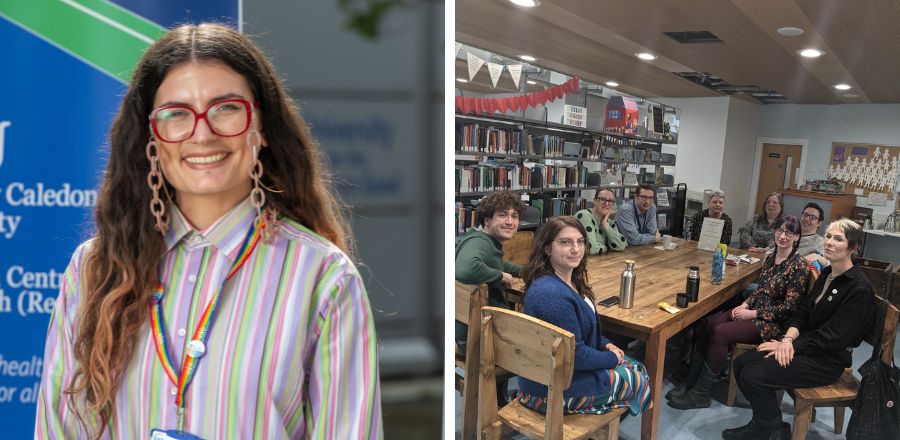PhD students share research as part of interactive LGBTQIA+ History Month Research Cafes

PhD researchers at GCU have recently had the chance to share their research as part of GCU’s Research Cafes, which invites speakers to share their work in an informal setting.
As part of LGBTQIA+ History Month, speakers within LGBTQIA+ academia were invited to discuss their work with students and staff to help increase visibility around historical movements within the community.
LGBT+ History Month is a month-long observance of lesbian, gay, bisexual, transgender and queer history.
The LGBTQIA+ History Month Research Cafes took place on campus in the Relax and Renew area across two sessions; one on February 16 and on February 23. Students and staff had the chance to listen to the conversations, ask questions and meet dedicated LGBTQIA+ researchers.
Two of the speakers were PhD students Beth Meadows and Alexander McGuchan-Johnston, who had the chance to discuss their research to a different audience.
Beth, who’s research focuses on ‘Exploring Sober Nightlife Spaces for LGBTQIA+ Communities’, enjoyed having the opportunity to share her research with a diverse audience during an important month of visibility.
“I think LGBTQIA+ History Month is so important because of visibility. LGBTQIA+ rights are important all year round, but it’s nice to have a month where all eyes are on it. It helps draw attention to issues that, for queer communities, exist throughout the year. It’s good to have an opportunity to have attention brought to it and to be in solidarity. People may learn things that they didn’t know previously and encourage them to take action.” She explained.
“There’s two sides to it; I do really welcome months of visibility but it’s important to understand that these issued don’t just exist for a month. The good thing about the Research Cafes is that those who perhaps aren’t aware of the research going on at GCU can get the chance to find out and learn about it.”
Behind the Research Cafes is Professor Jamie Frankis, who invited Beth to discuss her research as part of the sessions. She said: “One of my professors, Jamie Frankis, is involved in the inception of the LGBTQIA+ History Month Research Cafes and he’s been working really hard to increase visibility for LGBTQIA+ networks across campus.
He asked me to be involved because he knows that my research is about LGBTQIA+ communities, so I’ve got that professional interest and personal stake in that area as a queer researcher.” She explained.”
She added: “I really enjoy the presentation side of academia, probably a bit more than sitting down and writing, so he knew I’d be really engaged. I love to be able to share my research with an audience that may have not otherwise got access to it. It also allows members of staff, not necessarily just academics, can come to the Research Cafes.
We’ve had staff from different departments across campus come along to them, and they may have not had the chance to do that otherwise so that was really good. That was what also attracted me to take part, because the presentations that I do usually are normally other researchers and academics from my field.”
Beth, who took part in the Research Café for the first time, has seen the benefits of using the opportunity to widen your access when it comes to sharing your research. She explained: “The motivation behind my research is to make it as accessible as possible and to reach wider audiences beyond academics.
I feel very passionate about that and that’s why I’ll always take the opportunities to do it. The Research Cafes are a great example of getting to do that, especially since the GCU Library is an open-access building so anyone can get access to it. We had lots of diverse staff from across the university and I even stayed behind for a few hours to speak to librarians, communication departments, disability service so it wasn’t just my colleagues.”
With the end of the month approaching, Beth is pleased to have seen such a positive reaction towards the Research Cafes.
“I think it was really well attended, I was surprised at how many people were able to attend! I had never spoken at a Research Café before but I feel that it went really well and that it was engaging; everyone at the table had something to say.
Each researcher took 10 minutes to introduce themselves and their research. After that, the audience had the chance to discuss and make comments, but it was really informal so it worked well. Some people even shared their lived experiences, and my research area is on sober spaces for LGBTQIA+ communities so it can be quite a sensitive area for people. Afterwards, I stood and spoke to a number of people once the session was finished so I’d like to think that it went beyond the expectation of the Research Café.”
Despite involving researchers, Beth wants to encourage students from any background or discipline to engage with a Research Cafe if they have the chance to attend. She said: “It’s a snippet into the world of research but in a way that it’s very informal and less intimidating. It also gives them an insight into what a researcher looks like and the Research Cafes are a great strand for academics to use to engage people with their research.
All students are welcome, they can come sit and listen to the conversation and ask any questions. Even if it’s a subject that isn’t necessarily on your syllabus, it’s a good way to come learn about something that you’re interested in.”
By Rachael McAlonan
Got a SCEBE or GSBS story? Email me at Rachael.McAlonan@gcu.ac.uk or connect with me on social media
